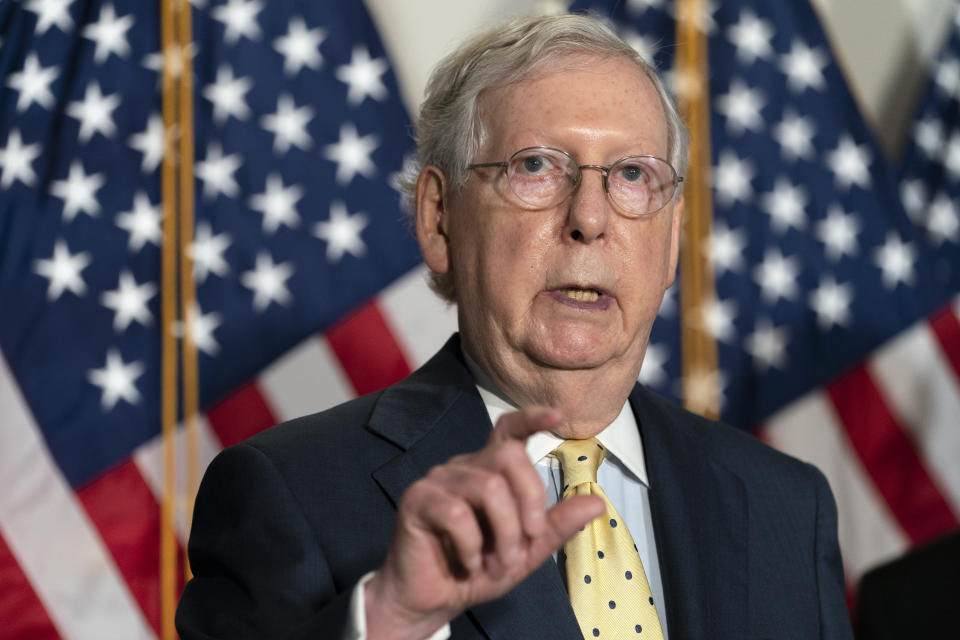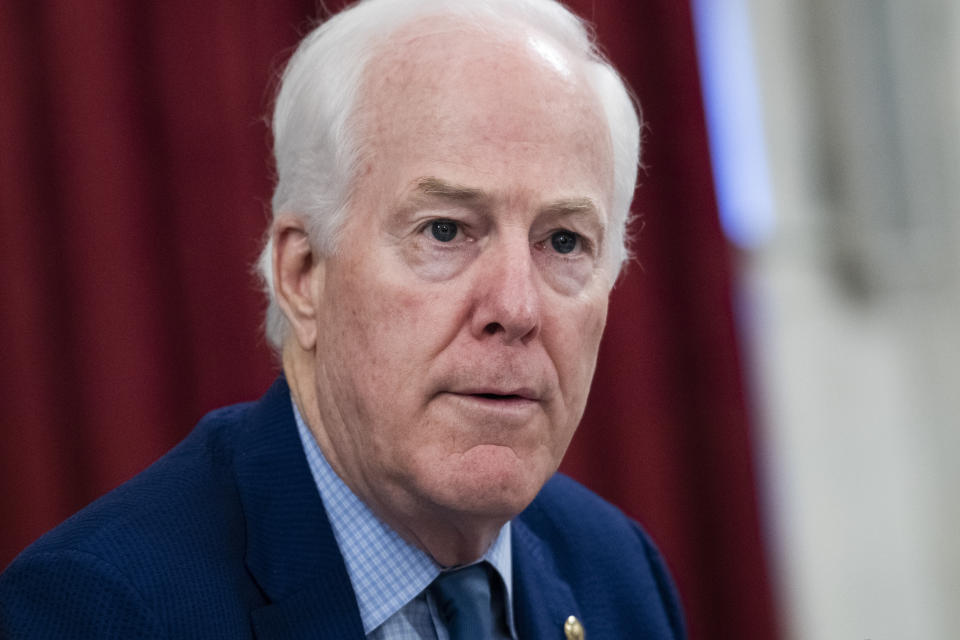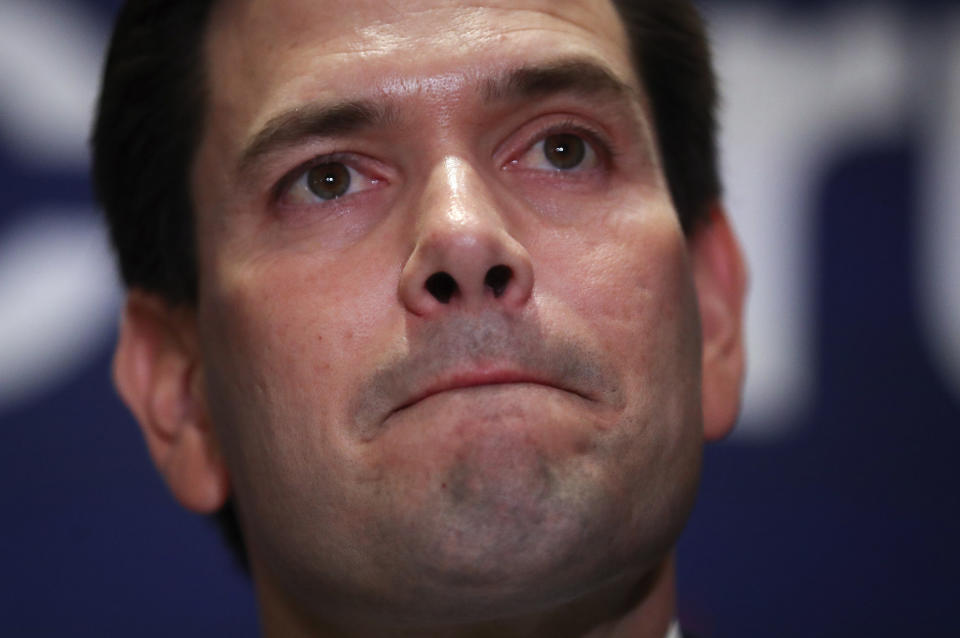Then and now: Republican senators flip-flop on appointing Supreme Court nominee in an election year
What a difference four years can make.
Seventeen Republican senators appear to have had an abrupt change of heart when it comes to the idea of confirming a nominee to the Supreme Court in a presidential election year. In 2016, following the death of Justice Antonin Scalia, they pushed a new standard for Senate confirmation of a nominee to the high court: that in an election year, deference should be given to the will of the voters. But after Justice Ruth Bader Ginsburg died on Friday, that argument has all but been abandoned by Republicans.
Here’s a comparison of the statements that some of the most notable GOP senators have made.
Sen. Mitch McConnell, R-Ky.

Then
“This nomination ought to be made by the president we’re in the process of electing this year,” McConnell told CNN in 2016 on his decision not to bring then-President Obama’s nominee to fill Scalia’s seat up for a vote, adding. “But this is not about this particular judge. This is about who should make the appointment. We’re in the process of picking the president, and that new president ought to make this appointment, which will affect the Supreme Court maybe for the next quarter of a century.”
Now
“Americans reelected our majority in 2016 and expanded it in 2018 because we pledged to work with President Trump and support his agenda, particularly his outstanding appointments to the federal judiciary. Once again, we will keep our promise. President Trump’s nominee will receive a vote on the floor of the United States Senate,” McConnell said in a statement on Friday following the announcement of Ginsburg’s death.
Sen. Lindsey Graham, R-S.C.

Then
“I want you to use my words against me. If there’s a Republican president in 2016 and a vacancy occurs in the last year of the first term, you can say Lindsey Graham said let’s let the next president, whoever it might be, make that nomination,” Graham told his colleagues during a 2016 Senate meeting.
Two years later, Graham, who is now chairman of the Senate Judiciary Committee, doubled down on those remarks, making it clear that the principle should hold for whoever Trump might nominate in 2020.
“If an opening comes in the last year of President Trump’s term, and the primary process has started, we’ll wait to the next election.”
Now
“When the American people elected a Republican Senate majority in 2014, Americans did so because we committed to checking and balancing the end of President Obama’s lame duck presidency. We did so. We followed the precedent that the Senate has followed for 140 years: Since the 1880s, no Senate has confirmed an opposite-party president’s Supreme Court nominee during an election year,” Graham wrote in a letter on Monday to some of his Democratic colleagues, adding, “Lastly, after the treatment of Justice Kavanaugh, I now have a different view of the judicial confirmation process. Compare the treatment of Robert Bork, Clarence Thomas, Samuel Alito and Brett Kavanaugh to that of Ruth Bader Ginsburg, Sonia Sotomayor and Elena Kagan, and it’s clear that there already is one set of rules for a Republican president and one set of rules for a Democrat president.
“I therefore think it is important that we proceed expeditiously to process any nomination made by President Trump to fill this vacancy. I am certain if the shoe were on the other foot, you would do the same.”
Sen. Joni Ernst, R-Iowa

Then
“We will see what the people say this fall and our next president, regardless of party, will be making that nomination.” Ernst told reporters on a conference call in 2016 in regards to whether the Senate should vote on Garland’s nomination to the court.
“Let’s all talk about it and then in November we’ll have that decision,” she said on the notion of leaving the decision of picking a nominee to the voters in an election year. “And if the decision is made that we have another Democratic president, that’s a decision we will live with.”
Now
“We have much to consider over the coming days. The Supreme Court plays a fundamental role in the defense of our Constitution and in the protection of our rights and liberties,” Ernst said in a statement released Monday. “Once the president puts forward his nominee for the Supreme Court, I will carry out my duty — as a member of the Senate Judiciary Committee — to evaluate the nominee for our nation’s highest court.”
Sen. Cory Gardner, R-Colo.

Then
“I think we’re too close to the election. The president who is elected in November should be the one who makes this decision,” Gardener said in a 2016 interview with KNUS radio, adding, “Our next election is too soon and the stakes are too high; the American people deserve a role in the process as the next Supreme Court justice will influence the direction of this country for years to come.”
Now
“I have and will continue to support judicial nominees who will protect our Constitution, not legislate from the bench, and uphold the law,” Gardner said in a statement released Monday. “Should a qualified nominee who meets this criteria be put forward, I will vote to confirm.”
Sen. Ted Cruz, R-Texas

Then
“It has been 80 years since a Supreme Court vacancy was nominated and confirmed in an election year. There is a long tradition that you don’t do this in an election year,” Cruz said during a 2016 appearance on “Meet the Press.”
Cruz also said he was not bothered by the prospect of leaving Scalia’s seat vacant even though doing so might result in a 4-4 tie on some decisions.
“Look, the consequence of a 4-4 tie is that the judgment of the court of appeals is affirmed by an equally divided vote. This has happened many times in history that there have been vacancies, sometimes on a closely contentious case. They’ll hold it over for the next term, when the replacement justice arrives,” Cruz said. “In an election year, we have a long tradition that a lame duck president doesn’t get to jam a Supreme Court nominee through on the very end. LBJ tried that and the Supreme Court rejected it. And particularly when the court is 5-4, is balanced, an Obama liberal nominee would dramatically shift the U.S. Supreme Court.”
Now
“In this instance, the American people voted. They elected Donald Trump. A big part of the reason they elected Donald Trump is because of the Scalia vacancy and they wanted principle constitutionalists on the court,” Cruz said Sunday in an interview with the ABC News program “This Week.” “And so the president was elected to do this and the Senate was elected to confirm this nomination.”
Cruz has also amended his view on the court being deadlocked as a result of an empty seat.
“An equally divided court, 4-4, can’t decide anything,” Cruz said. “That could make this presidential election drag on weeks and months and well into next year. That is an intolerable situation for the county. We need a full court on Election Day, given the very high likelihood that we’re going to see litigation that goes to the court. We need a Supreme Court that can give a definitive answer for the county.”
Sen. John Cornyn, R-Texas

Then
“I believe the American people deserve to have a voice in the selection of the next Supreme Court Justice, and the best way to ensure that happens is to have the Senate consider a nomination made by the next President,” Cornyn said in a statement released in 2016. “Confirming a new Supreme Court Justice during a presidential election year for a vacancy arising that same year is not common in our nation’s history; the last time it happened was in 1932. And it has been almost 130 years since a presidential election year nominee was confirmed for a vacancy arising the same year under divided government as we have today.”
Now
Asked Monday whether Senate Republicans should confirm Trump’s nominee even if Biden wins the Nov. 3 election, Cornyn told CNN, “You mean while we’re still in our term of office and President Trump is? Of course.”
Pressed on the difference with his prior position, Cornyn said, “That’s because President Obama was term-limited out.”
Sen. Chuck Grassley, R-Iowa

Then
“A lifetime appointment that could dramatically impact individual freedoms and change the direction of the court for at least a generation is too important to get bogged down in politics. The American people shouldn’t be denied a voice,” Grassley, the Senate Judiciary Committee chairman, said in a 2016 statement.
Now
“Over the years, and as recently as July, I’ve consistently said that taking up and evaluating a nominee in 2020 would be a decision for the current chairman of the Judiciary Committee and the Senate majority leader," Grassley said in a Monday statement to the Des Moines Register. “Both have confirmed their intentions to move forward, so that’s what will happen. Once the hearings are underway, it’s my responsibility to evaluate the nominee on the merits, just as I always have.”
Sen. Marco Rubio, R-Fla.

Then
“I don’t think we should be moving forward with a nominee in the last year of this president’s term. I would say that even if it was a Republican president,” Rubio said in 2016.
Now
“In 2016, President Obama exercised his Constitutional duty and nominated Merrick Garland to the Supreme Court, and the Senate exercised its Constitutional obligation and decided not to consent,” Rubio said in a statement released Monday. “Now, President Trump should exercise his duty to name a nominee. And the Senate should once again exercise its Constitutional obligation and decide whether or not to consent to his choice.”
Cover thumbnail photo: Meg Kinnard/AP, via C-SPAN.
_____
Read more from Yahoo News:

 Yahoo Finance
Yahoo Finance 

